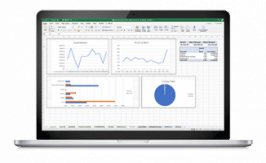Surgent IQ
Showing 9–12 of 13 results
-

Core Data Analytics Module 8: Advanced Formulas – Array Formulas and DAX Formulas
Course Description
This one-hour data analytics course will introduce you to formulas in Power BI and Microsoft® Excel®. Learn the skills to create and evaluate both array and DAX formulas, and discuss implicit for explicit intersections and measures within the formulas. Then, you will apply your understanding to data and work alongside the instructor to create calculated columns in Power Pivot using DAX and array formulas.
Learning Objectives
- Understand the applicable Excel® skills required in making the transition to data analyst
- Understand the basic requirements to create array and DAX formulas using Power BI and Excel®
- Understand how DAX formulas relate to calculated columns and how they can be created within calculated columns
- Apply understanding of DAX formulas to create calculated columns using Power Pivot
- Learn to create hierarchies in Excel® with calculated columns
-

Core Data Analytics Module 9: Artificial Intelligence – Basic Concepts in Excel
Course Description
This one-hour course serves as an introduction to artificial intelligence (AI) and how it’s utilized in Microsoft® Excel®. First, you’ll learn the basics of linear regression and its application. Then, you’ll learn AI functions such as forecasting, trend analysis, regression analysis and predictive modeling.
Learning Objectives
- Understand the applicable Excel® skills that will be required in making the transition to data analyst
- Understand what artificial intelligence is and how it relates to data analytics
- Understand the basics of performing linear regression and apply that understanding to data
- Be able to accurately model data and create a prediction model
- Be able to apply trend analysis and forecasting functions to data in Excel®
-

Core Data Analytics: Excel and Power BI Skills for Accounting and Finance Professionals
It’s no surprise that technology & big data have become ubiquitous in day-to-day operations. Data scientists, data analysts and non-IT professionals with data analytics knowledge have become critical to large businesses. They facilitate organizations’ quest to transform raw data into workable formats, helping identify trends and draw meaningful conclusions.
Accounting and finance professionals can set themselves apart from colleagues and future-proof their careers by developing an expertise in data analytics. Improve your skills in evaluating business performance, identifying and managing risk and analyzing customer behavior to anticipate market trends.
In this ten-part on-demand webcast series, we’ll concentrate on the Power BI tools in Microsoft® Excel® that enable accounting, auditing, and finance professionals to develop their own self-service data analysis.
By completing all ten modules, you’ll earn a professional certification, demonstrating to current employers and future hiring managers that you’ve got just the right skills to bring value to their organization.
-

Core Data Analytics: Excel and Power BI Skills for Accounting and Finance Professionals: University Edition
Data Analytics Course Description
It’s no surprise that technology and the big data it produces have become ubiquitous in day-to-day operations. Data scientists, data analysts and non-IT professionals with data analytics knowledge have become critical to large businesses. These professionals transform raw data into workable formats, which can be used to identify trends and draw meaningful conclusions.
Accounting and finance professionals can both set themselves apart from their colleagues and future-proof their careers by developing expertise in data analytics. Professionals both in public accounting and in industry can use these skills to make sense of the massive quantities of financial information available to evaluate business performance, identify and manage risk and analyze customer behavior to anticipate market trends.In this ten-part series, we’ll concentrate on the Power BI tools in Microsoft Excel® that enable accounting, auditing and finance professionals to develop their own self-service data analysis.


